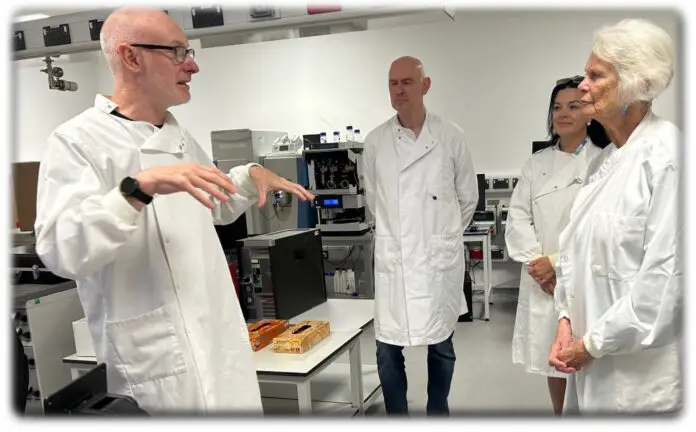MANCHESTER scientists will continue their groundbreaking work into lung cancer thanks to up to £4m of funding from Cancer Research UK over the next five years.
The funding renewal for the Lung Cancer Centre of Excellence*— which is supported by ScottishPower — comes a decade after the Centre was launched to tackle the disease which is the third most common cancer in the UK and the biggest cancer killer.
The investment coincides with new analysis from the charity, released to mark Lung Cancer Awareness Month, and shine a light on the advances in research that are helping to drive improvements in prevention, diagnosis and treatment.
In the North West, around 4,000 lives are saved from lung cancer every year. That’s around 10 people every day.** And since the 1970s, around 77,800 deaths have been avoided from the disease in the region.***
Developing better treatments for patients with lung cancer had lagged behind other cancers, with little improvement seen over time due to its complex biology, resulting in poor survival rates.
However, great strides have been made particularly over the past decade since the Lung Cancer Centre of Excellence (LCCE) was established sharing expertise at the Cancer Research UK Manchester Centre and University College London (UCL).
Researchers have shown air pollution can cause inflammation leading to non-small cell lung cancer – a discovery which will have significant implications for public health and prevention strategies.
More than 15 computational tools have been developed since 2019, which are widely adopted in lung cancer research and beyond. These tools help researchers understand how tumours evolve over time, analysing immune cell content in blood samples and revealing genetic changes driving cancer.
Researchers at the LCCE have been at the forefront of Europe’s efforts in lung cancer screening, influencing national policies on early lung cancer detection.
The LCCE collaborates with international experts, driving lung cancer research on a global scale. This includes partnerships for clinical trials, data sharing and the development of new approaches to lung cancer diagnosis and treatment with international collaborators from the USA to Germany, Canada to Australia.
The research continues to build on long standing expertise in Manchester, involving teams based at the Cancer Research UK National Biomarker Centre, the Cancer Research UK Manchester Institute, The University of Manchester and The Christie.
Rebecca Fletcher has welcomed the renewed funding. She understands the devastating impact of lung cancer, having lost her mum to the disease just two months after she was diagnosed.
Rebecca, who is Public Health Director for Oldham, and lives in Salford with partner Mike, recalls her mum always smoking from her being a youngster in the 1970s.
When mum-of-two Lesley was diagnosed with lung cancer in 2009, the disease was already so advanced that she was unable to start treatment. She was given pain relief and died the day after Boxing Day aged 63 – at Wythenshawe Hospital.
Rebecca, aged 48, said: “It was devastating to lose my mum to lung cancer. Particularly as she died so quickly after being diagnosed.
“I know from my day job that lung cancer remains a deadly disease in the North West and can be a “forgotten” cancer which isn’t talked about enough.
“As someone who has supported Cancer Research UK by fundraising at events like Race for Life, I am so heartened to see considerable investment in tackling the disease which killed my mum.
“The research expertise in Manchester sounds amazing and gives my family such hope for the future.”
Professor Caroline Dive, Interim Director of the Cancer Research UK Manchester Institute, said: “We are thrilled that the Lung Cancer Centre of Excellence’s funding has been renewed.
“It’s fantastic recognition of the hard and tireless work of researchers in Manchester tackling a disease which remains a significant cause of cancer death in this region. Lung cancer patients nationwide are now benefitting from the world class research and medical expertise which will lead to better ways of early detection and more effective treatment which saves lives.”







